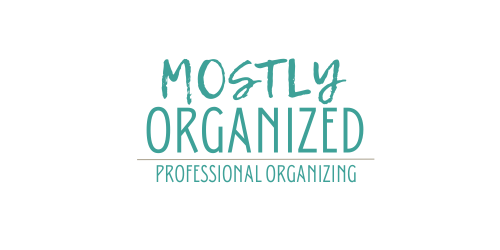Stop Clutter at the Source
Tell me if this has ever happened to you.
You declutter a whole bunch just to realize a few months later that your clutter has returned, and you feel defeated.
How can that be?
There are usually 3 main reasons why clutter re-accumulates:
1. Continually buying new stuff, instead of learning to live with the free space;
2. Saying yes to free stuff, even when we don’t need it;
3. Failing at the last decluttering step: getting rid of it.
So, if you find yourself having to declutter big and often, maybe it’s time to examine what you purchase, accumulate or collect, why and when you get triggered into making a purchase.
Stop Clutter Before it Enters your Home
Here are a few things you can do to understand why this happens and stop clutter in its tracks.
1. List your most recent purchases
Have you caught yourself saying, “well, it was only (insert amount of money), so even if I end up not liking it, it’s not a big deal“ or, “it was on sale!“
This is a dangerous way of thinking, precisely because it makes it OK for us to buy crap of lesser quality that will probably end up in the trash a few months later.
If you didn’t need it in the first place, it’s not a bargain.
Let me repeat that … It’s NOT a bargain if you didn’t NEED it in the first place!!
So, look at your recent purchases (30 days).
You can do this easily if you mostly use your bank or credit cards. I guarantee that just listing your purchases will have an impact on how you see your consumerism.
It’s not the most exciting thing to do, but it’s so easy to forget how much money you’ve spent and looking at the list regularly is eye-opening.
2. Say no to free stuff
Do you always grab the free gifts?
You know, the tote bag, the pen, the lanyards, etc., only to dump them in the bottom of a drawer, never to be used?
Know that you can always say no thank you to free items if you know they are not for you. Be prepared to get a few sideways looks, but also to come out of it feeling lighter. It’s a sure way to stop clutter before it enters your home.
3. Say no to hand-me-downs
Getting that coveted mid-century chair from grandma or that expensive power tool from Uncle Joe is amazing.
But getting hand-me-downs, when you don’t want them, have no space for them or won’t ever use them, is a major burden. And saying no to family and friends is especially hard.
I know in the past I’ve given away stuff to my loved ones without asking them if they actually were going to use it. Now I know better, and I ask: do you want this, and will you use it?
So, when your aunt-I-saved-this-just-for-you offers you her stuff, know that it probably makes her feel better to give it to someone she knows. But it is okay to say: Thank you for thinking of me but no thank you.
4. Identify your weaknesses and eliminate the trigger
If you are having a hard time breaking your shopping habit and end up having to declutter more often than you should, analyze where you spend the most, how often and what makes you tick?
Are you influenced by all the pretty images you see online, making you think you need this or that to redecorate? I’m certainly guilty of that, especially with being stuck at home a lot. You can keep the inspo somewhere like Pinterest, but don’t feel obligated to follow all the trends.
You can probably identify brand names you fall for, stores where you usually spend more than you planned to (oh Hello Costco!), or categories eating at your paycheque.
Marketers are continuously devising strategies and tactics to influence you to buy more stuff; that’s their job. Your job is to know exactly what you want and need, so you can look at an ad without being triggered.
So, eliminate some of the triggers. Make a list of what you need when you go shopping and stick to it. Unsubscribing from sales or brand newsletters will also help and I guarantee you won’t be tempted as much.
5. Identify the reason why you want to fill your space again
Are you bored or sad? Or maybe the empty space is making you feel uncomfortable?
Do you go shopping for fun, just to get out of the house (Thanks 2020!), or as a hobby? Maybe it’s time to stop clutter from entering your space you find a new past-time:
Try your hands at a creative hobby (no need to go buy all the things though);
Learn or perfect a new skill;
Try a new recipe;
Call a friend and catch up instead.
Replace the shopping habit with self-care. You’ll feel much better:
Go for a walk;
Have a shower or a bath;
Put on some music or your favourite show;
Journal your feelings about wanting ALL the things.
6. Do a spending freeze for 30 days.
Now that you know where you spend the most, without much thought, freeze spending for those categories or particular stores for 30 days. See if you can break the urge that way.
You could also go all-in and freeze spending on all things non-essential: everything but food, gas and toiletries.
Regardless of the option you choose, see if this experiment makes you a little more mindful of your spending habits and urges.
If you want a great guide and motivation companion, check Cait Flanders or listen to this interview to learn how to do this:
7. Identify why you keep stuff around that you don’t need or use
Do you keep stuff, just in case? I know that one intimately 🙋🏻♀️ !
You want to be prepared, ready for whatever life throws at you. But apart from an emergency Go-Bag or box, there isn’t much you should have in your home JUST IN CASE.
Don’t let just in case items fill your prime real estate, AKA storage space. Use it or ditch it!
If you still feel uncertain about some items, box them up and put them away. Put a date on the box, let’s say 6 months or a year from now (depending on how much space you have available). If you haven’t touched the box by that date, just get rid of it without opening it.
8. Just get rid of it
If you decluttered, here are a couple tips to complete the cycle and get rid of things.
Have a permanent donation box or bin. Having a holding space for the stuff you want to get rid of, makes it easier to declutter as you go.
When the bin is full, bring the items to your car or by the door.
On your next trip out, bring your donations to the proper locations: charity shop, recycling or eco-centre, library, etc.
If you’re decluttering a lot right now, do this weekly.
I hope these tips help you stop the clutter at the source, and you never have to set aside your precious two-week vacation to do a decluttering marathon.



